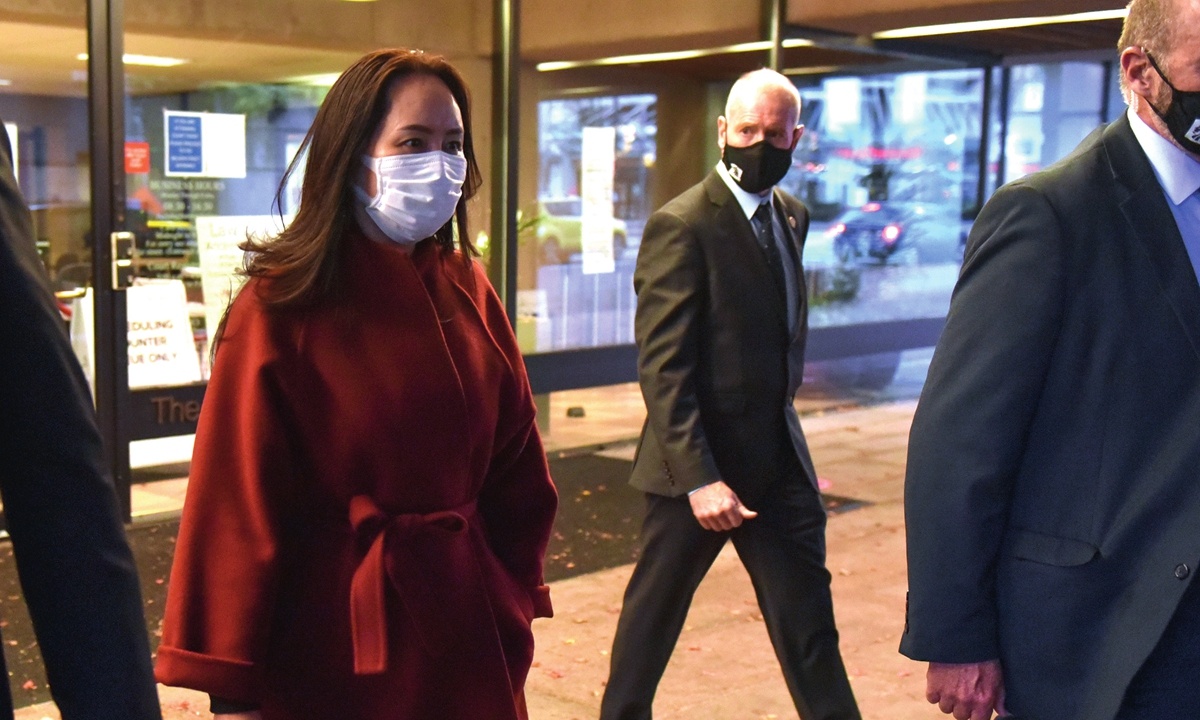
Huawei Chief Financial Officer Meng Wanzhou leaves the British Columbia Supreme Court with her security team, in Vancouver, Canada, on Tuesday. A Canadian police officer refused to testify at Meng's latest extradition hearing, which sparked more suspicions, and the Chinese Foreign Ministry on Wednesday noted the essence of the case became much clearer -- politics.
In response to Canadian Foreign Minister's latest claim that China uses "coercive diplomacy" and "detained foreign nationals at will," Chinese Embassy in Canada urged Canadian side to look at itself in the mirror and stop interfering in other countries' internal affairs using double standards.
Canadian Foreign Minister Francois-Philippe Champagne said on Tuesday that China, with its "coercive diplomacy," has "detained foreign nationals at will." He also commented on China's dealings with Hong Kong, Xinjiang, and human rights issues, which China expressed strong dissatisfaction with and is firmly opposed to.
The Chinese Embassy in Canada slammed the statement on Wednesday, saying that China has always treated other countries with respect and upheld the principles of human rights, while Canada ignored its own systemic problems and adopted double standards.
"China embraces a friendly relationship with other countries based on mutual respect and equal-footed dialogue, while standing firm on maintaining our own sovereignty, security, and development interests," read the statement by the Chinese Embassy.
The Canadian nationals referred to in Champagne's claim were arrested by Chinese judicial authorities for committing crimes that harmed China's national security. In comparison, Meng Wanzhou has been unreasonably detained without violating any Canadian laws.
In this sense, it is Canada's move, rather than China's, that constitutes "detaining foreign nationals at will," the statement said.
"China has also been upholding and protecting human rights. The current human rights situation in China is at its best in history, and only the Chinese people have the most say in this," the Chinese Embassy spokesperson added.
With regard to the issues of Hong Kong and Xinjiang, the embassy explained that the implementation of the national security law in Hong Kong helps the region to maintain stability and prosperity while granting HK residents their lawful rights. The Chinese government has taken anti-terrorism measures in Xinjiang in accordance with the law, which has reversed the security situation in the region and won the heartfelt support of all ethnic groups.
Slamming Champagne's false accusations, the embassy urged Canada to "look at itself in the mirror," and reflect on its own stigma as well as its domestic systemic problems such as deep-rooted racial discrimination.
Canada should stop playing with double standards and meddling in other countries' internal affairs using human rights issues as a pretext, the embassy stressed.
Canada had previously expressed hope of cooperating with China on climate change. China welcomes such cooperation, but only on the premise of mutual respect and equal-footed dialogue.
The embassy also called on Canada to solve current problems that hinder both sides from returning to a normal dialogue, and release Meng Wanzhou and let her return to China safely.


